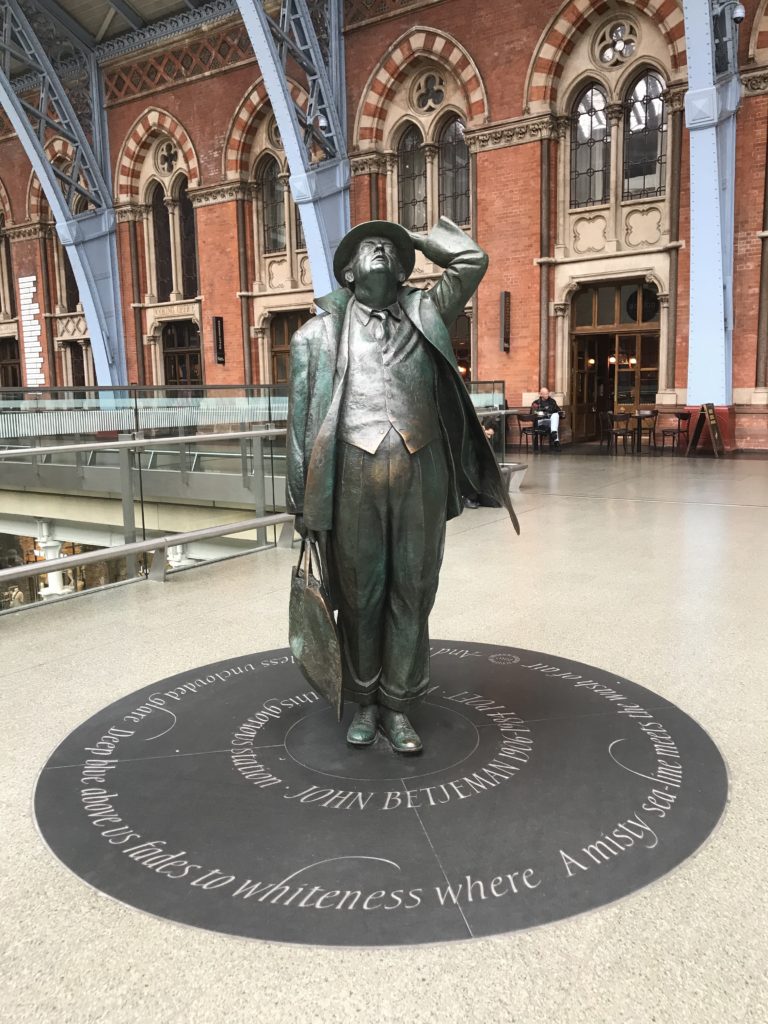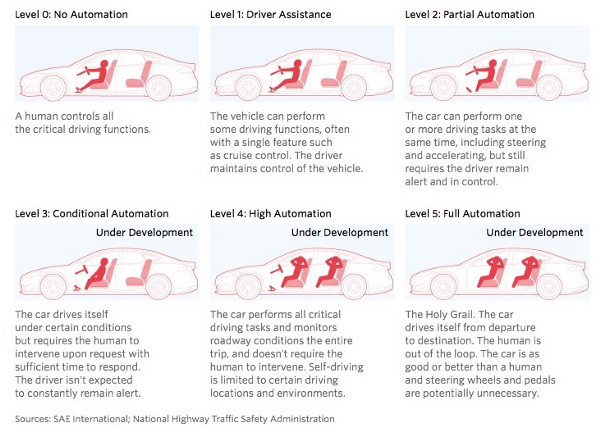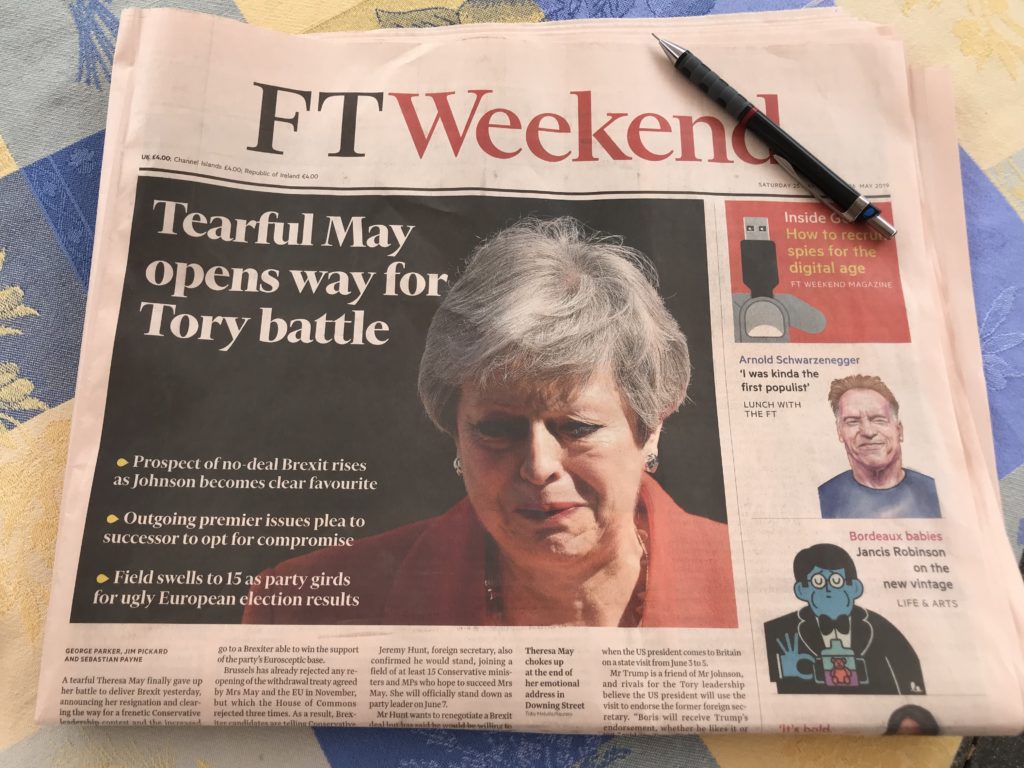The statue of the poet John Betjeman on the Grand Concourse of St Pancras station, surveying the building that his campaign saved from demolition.
Quote of the Day
“”The pleasures of ignorance are as great as the pleasures of knowledge”
- Aldous Huxley
(Even greater, perhaps. Just think of climate change denial.)
The life of a tech analyst
Nice quote from an essay by Benedict Evans:
There’s an old joke that the career of an analyst progresses from Word to Excel to Powerpoint. That’s pretty much what’s happened here over the last 20 years: first we discussed what might happen (“imagine if everyone had a phone!”), then we tracked the numbers of what was happening, and finally we draw diagrams and bullet points of what that means. That’s where we are now – we try to work out what it means that almost everyone has a phone or a smartphone.
But this also means that now we go back to the beginning: I’m not updating my smartphone model anymore. The next fundamental trends in tech, today, are probably machine learning, crypto and regulation. I can write about those, but it’s too early to make charts.
Quote of the Day
”A better system will not automatically ensure a better life. In fact, the opposite is true: only by creating a better life can a better system be developed.”
Václev Havel in “The Power of the Powerless”
Fakebook
Great NYT column by Kara Swisher:
So, Fakebook it is.
This week, unlike YouTube, Facebook decided to keep up a video deliberately and maliciously doctored to make it appear as if Speaker Nancy Pelosi was drunk or perhaps crazy. She was not. She was instead the victim of an obvious dirty trick by a dubious outfit with a Facebook page called Politics WatchDog.
The social media giant deemed the video a hoax and demoted its distribution, but the half-measure clearly didn’t work. The video ran wild across the system.
Facebook’s product policy and counterterrorism executive, Monika Bickert, drew the short straw and had to try to come up with a cogent justification for why Facebook was helping spew ugly political propaganda.
“We think it’s important for people to make their own informed choice for what to believe,” she said in an interview with CNN’s Anderson Cooper. “Our job is to make sure we are getting them accurate information.”
So was this faked video “accurate information”, then? Of course not. Or, as Swisher continues,
Would a broadcast network air this? Never. Would a newspaper publish it? Not without serious repercussions. Would a marketing campaign like this ever pass muster? False advertising.
No other media could get away with spreading anything like this because they lack the immunity protection that Facebook and other tech companies enjoy under Section 230 of the Communications Decency Act. Section 230 was intended to spur innovation and encourage start-ups. Now it’s a shield to protect behemoths from any sensible rules.
In the end, we will have to get back to the Section 230 exemption.
Getting to autonomy
Apropos my Observer column, this from Frederic Filloux:
I would love to tell my Tesla to come and pick me up at home in Palo Alto and take me to the Sutter Street parking garage in San Francisco, “any level will be fine”, without intervention. But when will we get there?
If you believe Musk, it’s 2020. If you believe Chris Urmson, Google’s Director of Self-Driving Cars from 2013 to late 2016, it’s going to take three decades or more, although it’s possible that Waymo will ignore Page’s wise Level 5 edict and come out with Level 3 or 4 for a client such as Audi, Mercedes, or BMW well before that. Can we learn to codify partial automation the way we codified MPG, speed, and emissions? Personally, I trust we will, perhaps helped by numbers such as fatalities or, less morbidly, frequency of driver intervention.
Thinking of applying to GCHQ?
Elon Musk may be a pain. But he’s not nuts
This morning’s Observer column:
You don’t have to be a psychiatrist to wonder if Elon Musk, the founder of Tesla, is off his rocker. I mean to say, how many leaders of US public companies get into trouble with the US Securities and Exchange Commission for falsely claiming that they have secured funding to take their company private at $420 a share – and then get sued and fined $40m? Or can you imagine another CEO who deals with Wall Street analysts by swatting away questions about his company’s capital requirements as if they were flies. “Excuse me. Next. Next,” he replied to one guy who was pressing him on the subject. “Boring, bonehead questions are not cool. Next?”
The view from Wall Street is that Musk is too volatile to be in charge of a big and potentially important public company. The charitable view is less judgemental: it is that, while he may have a short fuse, he’s also a gifted, visionary disrupter. But even those who take this tolerant view were taken aback when he declared at a recent public event that he could see “one million robo-taxis on the roads by 2020”…
Murray Gell-Mann
Nice obit of the great (but prickly) physicist in the New York Times. Excerpt:
Much as atoms can be slotted into the rows and columns of the periodic table of the elements, Dr. Gell-Mann found a way, in 1961, to classify their smaller pieces — subatomic particles like protons, neutrons, and mesons, which were being discovered by the dozen in cosmic rays and particle accelerator blasts. Arranged according to their properties, the particles clustered in groups of eight and 10.
In a moment of whimsy, Dr. Gell-Mann, who hadn’t a mystical bone in his body, named his system the Eightfold Way after the Buddha’s eight-step path to enlightenment. He groaned ever after when people mistakenly inferred that particle physics was somehow related to Eastern philosophy.
Looking deeper, Dr. Gell-Mann realized that the patterns of the Eightfold Way could be further divided into triplets of even smaller components. He decided to call them quarks after a line from James Joyce’s “Finnegans Wake”: “Three quarks for Muster Mark.”
With Dr. Gell-Mann at the forefront, physics took on a Joycean feel. Before long there were up quarks and down quarks, strange quarks and charm quarks, top quarks and bottom quarks, all stuck together with particles called gluons. The funny nomenclature was as much a Gell-Mann inspiration as the mathematics.
Muster Mark must’ve been delighted.
Mayday, Mayday
Enoch Powell was right. All political careers end in failure. Or, to be precise,
“All political lives, unless they are cut off in midstream at a happy juncture, end in failure, because that is the nature of politics and of human affairs.”




